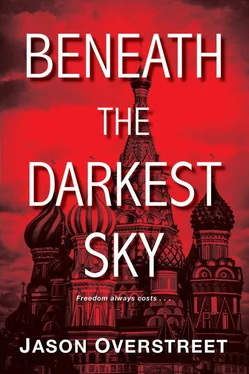Maybe there was something powerful going on here, some approach to changing unjust societies for the better good that I could use to help my people overcome their continuing plight against global, racial injustice. Might the still-burgeoning revolution that was taking place here serve as the blueprint for other countries? Perhaps the world needed a revolution. A young colored essayist I’d read a blurb about while in Haiti, a Mr. Richard Wright, seemed to believe so. And if he was back home in America feeling this way, who was I, an expatriate, and not by choice, to dismiss him? I needed to learn more.
I looked across the aisle at Dorene. I could have been more forthcoming with her on that festive night back in Pétion-Ville. I could have told her that there was a spiritual element behind my insatiable appetite for learning. For I seek to learn nothing merely for myself. I do it to honor that Negro of long-ago days. Perhaps he might have been lashed to within an inch of his life had he so much as dared to even open a book. I do it for him because I am able. How could I not? Even when I get angry at these ignorant men of today, I hear him whispering to me. He’s saying, No matter how tired your mind grows … how saddened your heart … how troubled your spirit … push forward in honor of me , you unshackled king !
* * *
During the last portion of our train ride, as we entered the outskirts of Moscow, I took in the scenery. James and Ginger looked about as if experiencing a new world. Upon first sight, my perception of this part of Moscow wasn’t positive. It was a rugged place—gray, dim, and harsh, even under a clear blue sky. Yet, I was struck by the fact that so many women were everywhere doing what we in the Western world considered men’s work—cleaning streets and driving trolley cars, many of them in padded overalls. It was forward-thinking equality on full display. Once we had disembarked at the station, we hopped on a trolley car and headed toward our destination—the Hotel National—where the chancery was staying. My daughter seemed particularly fixated on our stout, female driver. For reasons I could only imagine.
Perhaps Ginger was not only struck by the job this woman was doing, but by her appearance as well. She had a pretty face, and resembled what I’d seen of most the women here so far. They were huskily built, dressed in oversized, weathered, dark clothing—their skin drab. Dorene and Loretta stuck out like sore thumbs, as the Muscovite women wore no makeup or jewelry. Maybe my daughter was struck by this new-to-her-eyes representation of womanhood.
I, on the other hand, was taken by the architecture. I’d heard that the Red Square was pristine, but so far, as we drove through residential areas, all we’d seen were a bunch of log houses and dirt roads. I couldn’t wait to see some stone structures, to lay eyes on the old Czarist architecture I’d read so much about.
But the people hustling about had a pep in their step, the men dressed in wrong-sized suits and bulky, square shoes. Taste in attire didn’t seem to be an option. It was as if everyone had picked from the same pile of identical suits and garments, lucky if they’d picked the correct size.
As we continued through the city, my perception began to brighten and the sprawling city came alive. The people seemed happy in this bustling place. I could see the golden church domes in the distance and felt as if we were traveling on Moscow’s only wide boulevard, as if we were in the middle of a maze made up of narrow cobblestone side roads.
Taking note of how the streets were dominated by trains of three-car trolleys, I turned to Bobby, who was sitting next to me. “What is the schedule for the rest of the day?” I asked.
“It depends,” said Bobby. “Do you have to do your damn two-hour Kodokan exercise routine still? You haven’t had a chance to do it today.” He slapped my shoulder. “I’m just razzing you, Press.”
“I’ll do it first thing in the morning as always. It beats running, believe me!”
“Unbelievable.” He shook his head. “Anyway… the schedule. We’ll get the ladies checked in at the Hotel National, and then you and I will head over to Spaso House. Ambassador Bullitt has put aside a few minutes to receive us.”
“Remind me what he’s like again,” I said.
“A perfectionist. Rather serious-minded, but knows how to kid. Likes the finer things. Much finer! Even drives a sports roadster. Comes from a very influential family in Philadelphia. A Yale man. He’s made quite a reputation for himself over the years by establishing relationships throughout Europe. He even met Lenin back in 1919.”
“You’re kidding.”
“No, he was part of the U.S. delegation to the Paris Peace Conference, but he visited Soviet Russia on a hush-hush mission. He was long thought to be considered for a posting whenever America and the Soviet Union continued relations.”
“I wonder how he’s taken to Stalin.”
“I shall soon find out,” he said. “I’m sure he’s made every effort to establish a relationship. Bullitt is a workaholic. I’m not sure he’s much of a delegator, as he’s prone to doing everything himself. He’s damn smart. But I’m anxious to see how the staff is functioning. Anyway, he and I have a good relationship, one established off and on over the last ten years.”
Moments later we headed down Mokhovaya Street and approached the hotel, which was on Manezhnaya Square, across from the Kremlin. The entire area was breathtaking, a far cry from the log houses, dirt roads, and cobblestone alleyways we’d ridden past. This was the heart of Moscow, and every building looked ancient, powerful—even magical.
“I heard,” said Bobby, “that Lenin actually made his home here at this hotel for a few days back when the Kremlin was being repaired from damages. He stayed in room 107. As you can tell, I have been in constant communication with staff members here since before we left Haiti, trying to learn all I could before we arrived.”
“Well, stop. You’re getting my history bug all worked up.”
“Okay, Press.” He pointed to a five-story building next to the hotel. “That building is called the Mokhovaya. It is where all of our embassy staff has apartments and offices, our brand-new chancery. I’d heard it was finally complete, but now I’m not sure. Looks like they’re still working, at least on the exterior. Apparently Bullitt is in negotiations to have a permanent embassy and chancery compound built on some beautiful property called Sparrow Hills.”
“I wish we could walk for a while,” I said. “My legs are so stiff. I want to get the blood flowing and really feel this place.”
“We can. Spaso House is about a mile down. We have an open window to meet the ambassador between three and five. We’ll walk around a bit, at least head toward the Kremlin to get a quick taste of the area, and then we’ll catch a ride over to meet William.”
As soon as we walked into the lobby of the hotel, a middle-aged colored woman dressed in a lovely gold dress and high heels greeted us. She had the air of a performer, her stance quite erect, her makeup, gold purse, polished nails, and perfect bun-style hair all like something out of a movie.
“You must be Prescott and Loretta Sweet,” she said with a beaming smile, shaking both of our hands. “My name is Coretta Arle-Titz. I’m an American. The colored colony here in Moscow got wind of your pending venture this way some months back. Our journalist brother, Homer Smith, told us all. You didn’t think we’d let a lovely colored family like yours travel all the way to this foreign land without a contingent of your people being here to greet you, did you?”
Читать дальше











